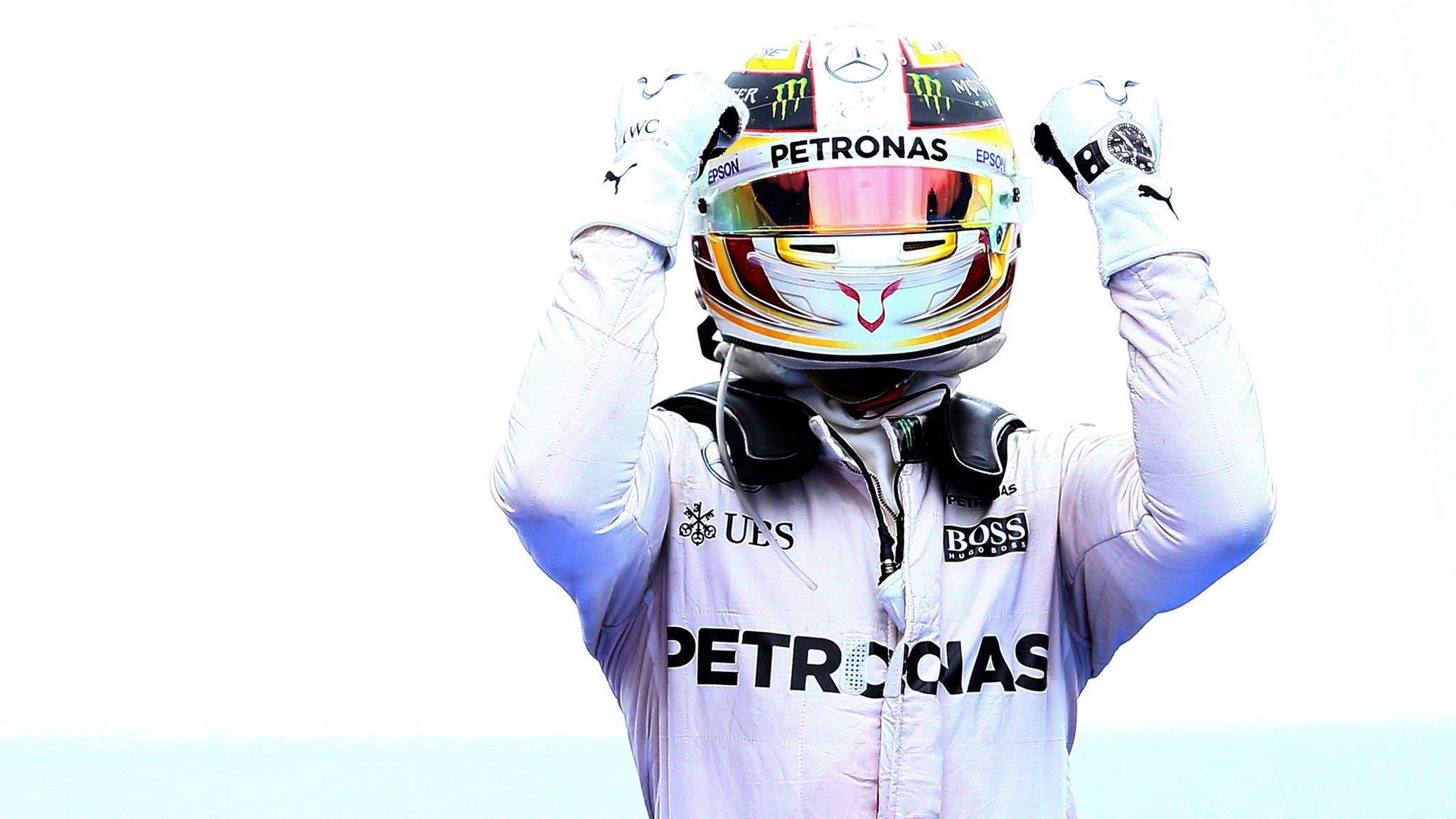Abu Dhabi GP: Would a crash help Lewis Hamilton steal F1 title?
- Published
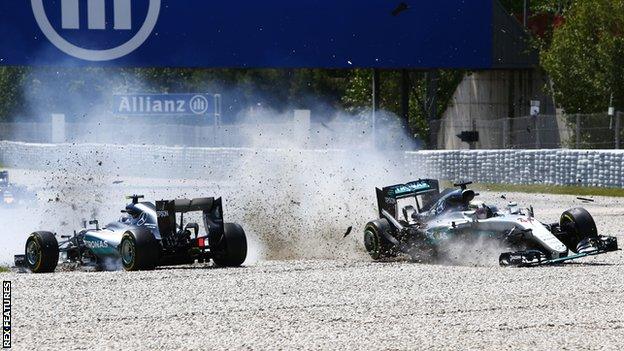
Sunday's title-deciding Abu Dhabi Grand Prix is live on the BBC Sport website and radio 5 live at 13:00 GMT
Picture the scene: the 2016 Abu Dhabi Grand Prix. Two laps to go.
Lewis Hamilton leads by just over a second from Mercedes team-mate Nico Rosberg but he knows that will not be enough to win the world championship.
Rosberg has the luxury of being able to finish third and still claim the title even if Hamilton wins, so something drastic needs to happen to derail the German.
A car failure? Unlikely. Puncture? Can't rely on that. What about a crash? Yeah, that might do it, if done right.
But Hamilton wouldn't do that, would he? And there's nothing to stop Rosberg from wiping them both out, either.
Although such action by both is highly unlikely, pressure does funny things to the mind, and there's not much more pressure than in the white-hot furnace of a world title battle.
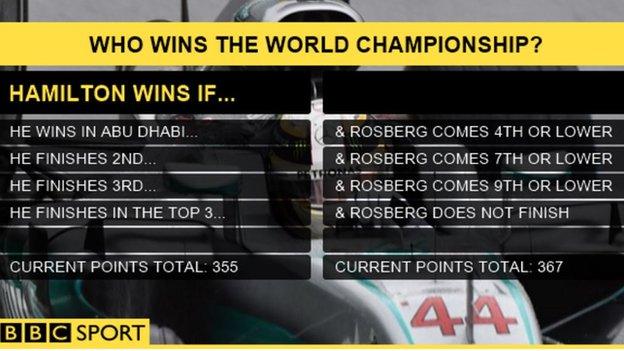
Mercedes team boss Toto Wolff says "you can never be confident" that two drivers contesting the world championship will not crash into each other.
"We also acknowledge the rivalry and the heat of the moment," Wolff told BBC Sport. "In a racing car, things happen - you always need to expect that it can run not smooth at all."
Wolff is right to acknowledge that collisions can happen before the season finale.
Hamilton and Rosberg have tangled on the track in the past, most famously taking each other into retirement in Spain earlier this year.
And Red Bull team boss Christian Horner has indicated his drivers, Max Verstappen and Daniel Ricciardo, are in no mood to sit back and let the Mercedes cars have their own fight.
In addition, there's a whole bunch of historical title-deciding "prangs" to consider.
Four of them, in fact:
Senna v Prost - 1989 Japanese Grand Prix
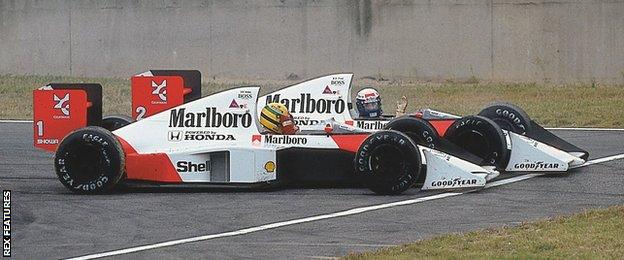
One of those notorious F1 moments that is routinely trotted when a world title is up for grabs.
At the penultimate race of the 1989 season at Suzuka, McLaren team-mates Alain Prost and Ayrton Senna collided on lap 46 while battling for the lead of the race.
Prost retired on the spot, but Senna - after a push from the marshals and rejoining down an escape road - recovered to win the race, only to be stripped of the victory for missing the chicane following the collision.
What was the outcome? Debate still rages about whether this was a racing incident or if Prost turned in on Senna. If it was the latter, then Prost benefitted from his own actions as Senna's disqualification gave him an unassailable lead before the final race in Australia.
Senna v Prost II - 1990 Japanese Grand Prix
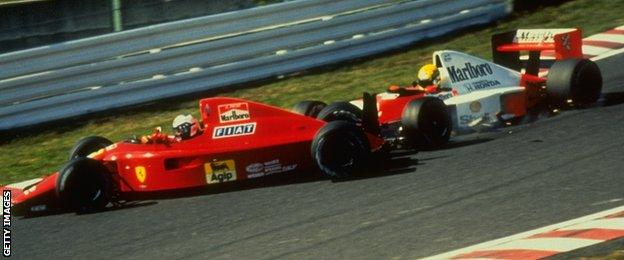
There's absolutely no doubt over who was responsible for this coming together at Suzuka 12 months later.
Senna, who qualified fastest, was unhappy that his pole position berth was not on the racing line and that the car in second place on the grid - who just happened to be title rival Prost - would have a better run to the first corner.
The Brazilian's request to switch sides was rejected and he warned that he would attempt to lead into the first corner regardless of whether Prost's Ferrari was there. He was as good as his word, and the two duly came to grief at Turn One.
What was the outcome? Senna escaped punishment for taking out his rival and was crowned world champion for the second time.
Schumacher v Hill - 1994 Australian Grand Prix
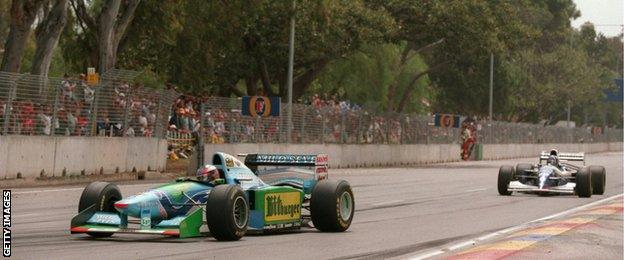
Michael Schumacher and Damon Hill arrived at the final race of 1994 on the Adelaide street circuit with just a point separating them.
Germany's Schumacher had the slender advantage. He had won six of the first seven races of the season but saw a huge lead gradually whittled away as he was disqualified from two races and banned from two more.
Benetton's Schumacher qualified second and Williams' Hill third, behind Nigel Mansell, but both managed to pass the 41-year-old at the start.
The German maintained his lead, with Hill following closely behind, until lap 36 when Schumacher ran wide at the East Terrace corner and clouted the wall.
He rejoined the track and Hill - who had not seen the impact - attempted to dive down the inside. Schumacher turned in, they collided and the German's Benetton ended up on two wheels.
He was eliminated on the spot and while Hill's Williams was initially able to continue it had suffered suspension damage that forced the Briton to retire. His championship hopes ended with a demoralised headshake in the Adelaide pits.
What was the outcome? Schumacher won the first of his seven world championships, while Hill had the consolation of being named BBC Sports Personality of the Year.
Schumacher v Villeneuve - 1997 European Grand Prix
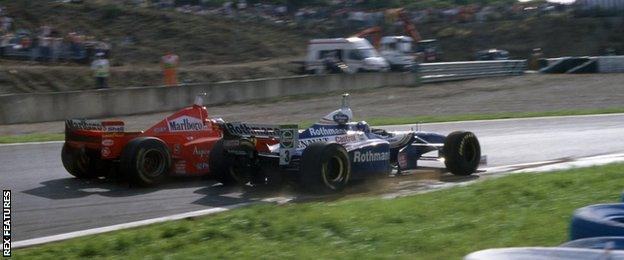
Schumacher again led the world championship by a single point from a Williams driver going into the final race of the season but this time he came off second-best in a mid-race collision.
The German overtook Jacques Villeneuve at the start - but on lap 48, the Canadian saw a gap and went for it. Schumacher turned in and there was a heavy impact. He was out. Villeneuve's Williams was damaged, but he was able to continue.
Villeneuve was overtaken by the McLarens of Mika Hakkinen and David Coulthard on the last lap but third place was good enough to secure his only drivers' title.
What was the outcome? Schumacher was stripped of his second place in the world championship but allowed to keep his points and race victories. He was also ordered to take part in a road-safety campaign.
- Published26 November 2016
